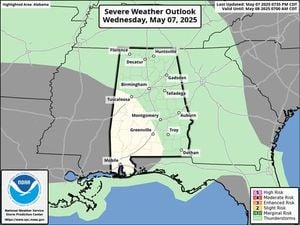On Wednesday, May 7, 2025, the Rassemblement National (RN) found itself back in court, this time as a civil party against Joël Hocquelet, the mayor of Marmande, in a case that has stirred political waters in France. The RN's legal action stems from Hocquelet's refusal to allow the party's president, Jordan Bardella, to hold a meeting in the town's Parc des expositions, a decision made in September 2024.
This case is particularly significant as it touches on the sensitive issue of political discrimination. The RN, represented by lawyer Me Thomas Laval, accused Hocquelet of "discrimination based on political opinions" after the mayor declined the venue rental request, citing concerns over public safety and the venue's capacity.
During the court proceedings, Hocquelet defended his decision, stating, "I estimated that a strong attendance of 3,000 to 5,000 people was predictable, and that we were not adapted to accommodate such a crowd." He further expressed fears of potential disturbances to public order, recalling incidents from 2023 when ecologist Marine Tondelier faced disruptions during her visit to Lot-et-Garonne.
However, the RN's legal team argued that the mayor's motivations were politically charged rather than based on genuine safety concerns. Laval pointed out that Hocquelet had previously admitted in the press that his refusal was not solely based on the risk of public disorder but rather on a fundamental disagreement with the RN's values. "There’s a contradiction between your defense today and your email where there’s no technical consideration," Laval asserted.
The political stakes of this case are high. If found guilty, Hocquelet could face a fine of up to €45,000 and potentially even ineligibility for future office. The public prosecutor, Olivier Naboulet, indicated that while he would seek a fine of €4,000, he would not recommend ineligibility, citing the mayor's character. "The imprisonment is not appropriate," Naboulet stated, suggesting that the punishment should be reflected in the fine.
The case has drawn significant attention, not only because it involves a sitting mayor but also due to the implications it holds for political discourse in France. The RN's complaint was filed on October 10, 2024, following Hocquelet's refusal to rent the venue, a decision that many observers labeled as a potential political misstep.
As the proceedings unfolded, the mayor's defense team emphasized that the refusal to host the RN was a collective decision made by the local government, with Hocquelet's first deputy, Charles Cillières, present in court to show support. Cillières explained, "It was a collective decision not to rent this hall, so it’s normal that we are here. We are here to support him."
In a rare move for French politics, a mayor is being tried for refusing to rent a public space to a political party, making this case a potential landmark in the interpretation of political freedoms in France. The outcome could set a precedent regarding the responsibilities of public officials to provide equal access to political venues.
The RN ultimately held its meeting in the nearby town of Tonneins, which attracted nearly 2,500 supporters, demonstrating that despite the legal battle, the party's support remains robust. Laval argued that this success indicates the RN did not suffer any real damage from Hocquelet's refusal.
As the court prepares to deliver its verdict on June 11, 2025, the implications of this case extend beyond the immediate parties involved. The decision will not only affect Hocquelet's political future but could also influence how local governments across France handle requests from political parties, particularly those with controversial or opposing viewpoints.
This case reflects a broader struggle within French politics, where the lines between political governance and personal belief systems often blur. The RN, which has been a significant player in French politics, continues to challenge the status quo, while local officials navigate the complexities of public safety, political ideology, and their responsibilities to their constituents.
As the political landscape evolves, this trial serves as a reminder of the ongoing debates surrounding freedom of assembly and political expression in France. The ruling will be watched closely by political analysts, party leaders, and citizens alike, eager to see how it will shape the future of political engagement in the country.




